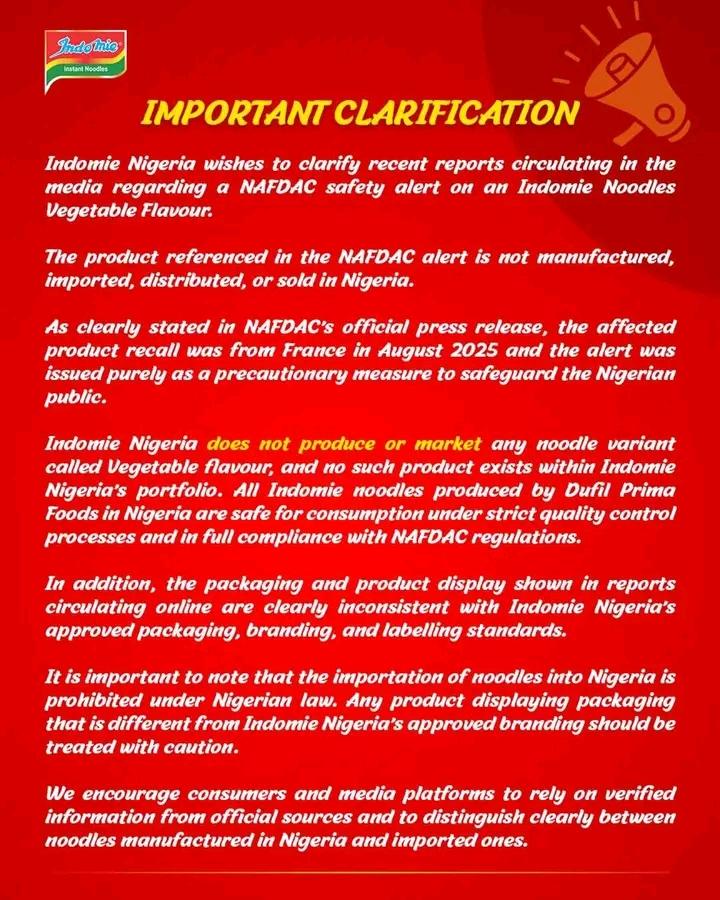
-
· 0 Yorumlar ·0 hisse senetleri ·593 Views1

-
Airstrikes Kill Over 40 Terrorists In Borno — NAF
The Nigerian Air Force (NAF) says more than 40 terrorists were killed in coordinated airstrikes carried out in Azir and Musarram areas of Borno State, successfully foiling planned attacks on nearby civilian communities.
In a statement on Sunday, NAF Spokesman, Commodore Ehimen Ejodame, disclosed that the precision strikes were conducted on January 15 and 16 by NAF aircraft operating under the Air Component of Operation Hadin Kai, following credible intelligence on terrorist movements and imminent threats.
Ejodame added that further aerial scans revealed terrorist elements attempting to regroup under nearby tree cover, prompting successive precision strikes that neutralised several of them.
#NAF #BornoState #OperationHadinKai #SecurityUpdateAirstrikes Kill Over 40 Terrorists In Borno — NAF The Nigerian Air Force (NAF) says more than 40 terrorists were killed in coordinated airstrikes carried out in Azir and Musarram areas of Borno State, successfully foiling planned attacks on nearby civilian communities. In a statement on Sunday, NAF Spokesman, Commodore Ehimen Ejodame, disclosed that the precision strikes were conducted on January 15 and 16 by NAF aircraft operating under the Air Component of Operation Hadin Kai, following credible intelligence on terrorist movements and imminent threats. Ejodame added that further aerial scans revealed terrorist elements attempting to regroup under nearby tree cover, prompting successive precision strikes that neutralised several of them. #NAF #BornoState #OperationHadinKai #SecurityUpdate0 Yorumlar ·0 hisse senetleri ·535 Views -
E don dey set for 9ja oo! Polish Ambassador Hail Nigerian Military, Say Armed Forces Na Backbone of West Africa Security
The Polish Ambassador to Nigeria, Michał Cygan, don praise Nigerian Armed Forces, describe Nigeria as a major stabilising force for West Africa. During courtesy visit to the Chief of the Air Staff, Air Marshal Sunday Aneke, for NAF Headquarters, Abuja, the ambassador talk say the Nigerian Air Force and other services don show high level professionalism and resilience in counter-insurgency and regional security operations. According to statement from Air Commodore Ehimen Ejodame, Cygan also express Poland interest to strengthen defence cooperation with Nigeria to support security priorities and regional peace. He add say Nigeria’s strategic position and sustained security engagements dey contribute well well to stability across the sub-region. On him own part, Air Marshal Aneke highlight the importance of international partnerships in tackling modern and asymmetric threats, noting say NAF remain committed to cooperation with friendly nations for better operations, training and information sharing. He reaffirm say the service dey open to mutually beneficial partnerships to boost counter-insurgency capacity and strengthen both regional and global security. Wahala oo, Nigeria security matter don turn global concern.
E don dey set for 9ja oo! Polish Ambassador Hail Nigerian Military, Say Armed Forces Na Backbone of West Africa Security The Polish Ambassador to Nigeria, Michał Cygan, don praise Nigerian Armed Forces, describe Nigeria as a major stabilising force for West Africa. During courtesy visit to the Chief of the Air Staff, Air Marshal Sunday Aneke, for NAF Headquarters, Abuja, the ambassador talk say the Nigerian Air Force and other services don show high level professionalism and resilience in counter-insurgency and regional security operations. According to statement from Air Commodore Ehimen Ejodame, Cygan also express Poland interest to strengthen defence cooperation with Nigeria to support security priorities and regional peace. He add say Nigeria’s strategic position and sustained security engagements dey contribute well well to stability across the sub-region. On him own part, Air Marshal Aneke highlight the importance of international partnerships in tackling modern and asymmetric threats, noting say NAF remain committed to cooperation with friendly nations for better operations, training and information sharing. He reaffirm say the service dey open to mutually beneficial partnerships to boost counter-insurgency capacity and strengthen both regional and global security. Wahala oo, Nigeria security matter don turn global concern.0 Yorumlar ·0 hisse senetleri ·316 Views -
Are Nigeria’s Airstrikes Finally Turning the Tide? Nigerian Air Force Bombs Terrorist Hideouts in Borno’s Timbuktu Triangle Under Operation Hadin Kai
Is Nigeria’s intensified air campaign beginning to weaken terrorist strongholds in the North-East? The Nigerian Air Force (NAF) has confirmed a major air interdiction operation targeting terrorist locations at AbbagaJiri in the Timbuktu Triangle of Borno State, carried out under the joint task force Operation Hadin Kai.
According to a statement by the NAF Director of Public Relations and Information, Air Commodore Ehimen Ejodame, the mission followed multi-source intelligence that confirmed active terrorist presence, fortified structures, and concealed logistics facilities in the area. Based on this intelligence, NAF air assets were deployed for integrated surveillance and precision strikes on identified targets.
The Air Force said the operation was carefully designed to degrade terrorist capabilities, deny them sanctuary, and shape the battlespace for advancing ground forces, while strictly adhering to rules of engagement and protecting non-combatants. Targeted structures believed to be used by terrorist elements were destroyed, while a follow-up strike neutralised armed fighters observed converging on the location.
Speaking on the mission, the Chief of the Air Staff, Air Marshal Sunday Aneke, described the operation as evidence of the Air Force’s determination to deliver precise and decisive airpower in support of ground troops. He stated that NAF would continue to deny terrorists freedom of movement, hideouts, and logistics wherever they attempt to regroup.
“Our operations are intelligence-led and carefully planned to achieve maximum impact on hostile elements while safeguarding innocent civilians,” Aneke said, reaffirming that pressure will be sustained until terrorist networks are completely dismantled. Ground troops who later advanced into the area reportedly confirmed the effectiveness of the airstrikes, validating the success of the joint air-land operation.
The Borno operation follows a similar strike in December 2025, when NAF targeted bandit camps in Tsafe Local Government Area of Zamfara State under Operation Fansan Yamma, destroying positions linked to a notorious bandit leader, Kachalla Dogo Sule. Those strikes were also based on what NAF described as credible, multi-source intelligence.
As Nigeria continues to battle insurgency and banditry across multiple regions, the latest operation raises key questions: Are precision airstrikes beginning to weaken terrorist networks? Can sustained intelligence-driven operations finally deny extremists safe havens? And will joint air-ground campaigns restore security to communities long terrorised by violence?
Are Nigeria’s Airstrikes Finally Turning the Tide? Nigerian Air Force Bombs Terrorist Hideouts in Borno’s Timbuktu Triangle Under Operation Hadin Kai Is Nigeria’s intensified air campaign beginning to weaken terrorist strongholds in the North-East? The Nigerian Air Force (NAF) has confirmed a major air interdiction operation targeting terrorist locations at AbbagaJiri in the Timbuktu Triangle of Borno State, carried out under the joint task force Operation Hadin Kai. According to a statement by the NAF Director of Public Relations and Information, Air Commodore Ehimen Ejodame, the mission followed multi-source intelligence that confirmed active terrorist presence, fortified structures, and concealed logistics facilities in the area. Based on this intelligence, NAF air assets were deployed for integrated surveillance and precision strikes on identified targets. The Air Force said the operation was carefully designed to degrade terrorist capabilities, deny them sanctuary, and shape the battlespace for advancing ground forces, while strictly adhering to rules of engagement and protecting non-combatants. Targeted structures believed to be used by terrorist elements were destroyed, while a follow-up strike neutralised armed fighters observed converging on the location. Speaking on the mission, the Chief of the Air Staff, Air Marshal Sunday Aneke, described the operation as evidence of the Air Force’s determination to deliver precise and decisive airpower in support of ground troops. He stated that NAF would continue to deny terrorists freedom of movement, hideouts, and logistics wherever they attempt to regroup. “Our operations are intelligence-led and carefully planned to achieve maximum impact on hostile elements while safeguarding innocent civilians,” Aneke said, reaffirming that pressure will be sustained until terrorist networks are completely dismantled. Ground troops who later advanced into the area reportedly confirmed the effectiveness of the airstrikes, validating the success of the joint air-land operation. The Borno operation follows a similar strike in December 2025, when NAF targeted bandit camps in Tsafe Local Government Area of Zamfara State under Operation Fansan Yamma, destroying positions linked to a notorious bandit leader, Kachalla Dogo Sule. Those strikes were also based on what NAF described as credible, multi-source intelligence. As Nigeria continues to battle insurgency and banditry across multiple regions, the latest operation raises key questions: Are precision airstrikes beginning to weaken terrorist networks? Can sustained intelligence-driven operations finally deny extremists safe havens? And will joint air-ground campaigns restore security to communities long terrorised by violence?0 Yorumlar ·0 hisse senetleri ·775 Views -
Why Is the ADC Inaugurating Zonal Congress Committees, Why Is It Rejecting Any Alliance With Atiku, Obi, Kwankwaso, and Jonathan, and What Does This Signal for Nigeria’s 2027 Politics?
A faction of the African Democratic Congress (ADC) has moved to strengthen its internal structure by inaugurating Zonal Congress Committees across three geopolitical zones, while firmly rejecting widespread speculation that the party is aligning with major political figures such as Atiku Abubakar, Peter Obi, Rabiu Kwankwaso, and Goodluck Jonathan.
In a communique signed by the party’s National Chairman, Hon. Nafiu Bala Gombe, the ADC said the exercise was part of efforts to entrench internal democracy, transparency, and strict adherence to the party’s constitution ahead of future elections.
According to the statement, the South-West Zonal Congress Committee was inaugurated in Ekiti State on January 7, 2026, with Hon. Bala Sani named Chairman and Hon. Kyauta Yakubu heading the Appeal Committee. The ceremony was conducted by the National Chairman himself.
In the South-East, a similar inauguration took place in Enugu State on the same date. Barrister Adamu Ado Dauda was appointed Chairman of the Congress Committee, while Mrs. Iyabo Salami Alibi was named head of the Appeal Committee. The event was presided over by the Secretary of the party’s Board of Trustees (BoT), Chief Rufus Ekenmi.
Earlier, on January 5, 2026, the party inaugurated its North-Central Zonal Congress Committee, appointing Hon. Lolo Ehirudu as Chairman of the Congress Committee and Hon. Sa’ad Aboki as head of the Appeal Committee.
Beyond organisational matters, the ADC used the occasion to directly address growing rumours of a possible political alliance with prominent national figures. The party categorically dismissed claims linking it to Atiku Abubakar, Labour Party’s 2023 presidential candidate Peter Obi, former Kano State Governor Rabiu Kwankwaso, and former President Goodluck Jonathan.
“The National Leadership reiterates its unwavering commitment to the principles of internal democracy, transparency, and strict adherence to the party’s constitution,” the communique stated, urging members and the public to “disregard and ignore” all reports of external political alignments. The party stressed that its focus remains on building “a strong, independent, and ideologically driven platform.”
The ADC also emphasised that only duly registered and financially up-to-date members would be eligible to vote or contest in its congresses and internal elections, reinforcing its claim of commitment to internal order and party discipline.
By distancing itself from Nigeria’s most recognisable political heavyweights, the party appears determined to project itself as an independent alternative within the country’s democratic space—one that is not defined by elite coalitions or personality-driven politics.
As speculation continues over emerging alliances ahead of future elections, observers are asking: Why is the ADC rejecting any association with established political figures? Is the party positioning itself as a third-force movement, or is this a strategic move to consolidate its base before engaging in broader negotiations? And could this internal reorganisation reshape opposition politics in Nigeria ahead of 2027?
The ADC insists its direction is clear: no external alliances, strict internal democracy, and a people-centred political platform—a stance that may test both its independence and its appeal in Nigeria’s highly competitive political landscape.Why Is the ADC Inaugurating Zonal Congress Committees, Why Is It Rejecting Any Alliance With Atiku, Obi, Kwankwaso, and Jonathan, and What Does This Signal for Nigeria’s 2027 Politics? A faction of the African Democratic Congress (ADC) has moved to strengthen its internal structure by inaugurating Zonal Congress Committees across three geopolitical zones, while firmly rejecting widespread speculation that the party is aligning with major political figures such as Atiku Abubakar, Peter Obi, Rabiu Kwankwaso, and Goodluck Jonathan. In a communique signed by the party’s National Chairman, Hon. Nafiu Bala Gombe, the ADC said the exercise was part of efforts to entrench internal democracy, transparency, and strict adherence to the party’s constitution ahead of future elections. According to the statement, the South-West Zonal Congress Committee was inaugurated in Ekiti State on January 7, 2026, with Hon. Bala Sani named Chairman and Hon. Kyauta Yakubu heading the Appeal Committee. The ceremony was conducted by the National Chairman himself. In the South-East, a similar inauguration took place in Enugu State on the same date. Barrister Adamu Ado Dauda was appointed Chairman of the Congress Committee, while Mrs. Iyabo Salami Alibi was named head of the Appeal Committee. The event was presided over by the Secretary of the party’s Board of Trustees (BoT), Chief Rufus Ekenmi. Earlier, on January 5, 2026, the party inaugurated its North-Central Zonal Congress Committee, appointing Hon. Lolo Ehirudu as Chairman of the Congress Committee and Hon. Sa’ad Aboki as head of the Appeal Committee. Beyond organisational matters, the ADC used the occasion to directly address growing rumours of a possible political alliance with prominent national figures. The party categorically dismissed claims linking it to Atiku Abubakar, Labour Party’s 2023 presidential candidate Peter Obi, former Kano State Governor Rabiu Kwankwaso, and former President Goodluck Jonathan. “The National Leadership reiterates its unwavering commitment to the principles of internal democracy, transparency, and strict adherence to the party’s constitution,” the communique stated, urging members and the public to “disregard and ignore” all reports of external political alignments. The party stressed that its focus remains on building “a strong, independent, and ideologically driven platform.” The ADC also emphasised that only duly registered and financially up-to-date members would be eligible to vote or contest in its congresses and internal elections, reinforcing its claim of commitment to internal order and party discipline. By distancing itself from Nigeria’s most recognisable political heavyweights, the party appears determined to project itself as an independent alternative within the country’s democratic space—one that is not defined by elite coalitions or personality-driven politics. As speculation continues over emerging alliances ahead of future elections, observers are asking: Why is the ADC rejecting any association with established political figures? Is the party positioning itself as a third-force movement, or is this a strategic move to consolidate its base before engaging in broader negotiations? And could this internal reorganisation reshape opposition politics in Nigeria ahead of 2027? The ADC insists its direction is clear: no external alliances, strict internal democracy, and a people-centred political platform—a stance that may test both its independence and its appeal in Nigeria’s highly competitive political landscape.0 Yorumlar ·0 hisse senetleri ·736 Views -
NAF ACCELERATES ACQUISITION OF 12 AH-1Z ATTACK HELICOPTERS TO ENHANCE SECURITY
In a strategic move to enhance the operational capacity of the Nigerian Air Force the Chief of the Air Staff Air Marshal Sunday Aneke, led a Programme Management Review meeting with senior United States Government officials and representatives of Messrs Bell Textron in San Diego, California, USA.
The engagement focused on fast-tracking the acquisition of 12 AH-1Z attack helicopters, a critical capability enhance professional, and mission-ready force capable of delivering decisive airpower in attainment of national security objectives.
A Statement by the Director of Public Relations and Information, Air Commodore Ehimen Ejodame indicates that Air Marshal Aneke expressed appreciation to the United States Government and Messrs Bell Textron for their continued cooperation, professionalism, and transparency in the execution of the helicopter acquisition programme.
The Air Chief noted that the acquisition of the AH-1Z helicopters represents more than a platform upgrade, describing it as a reflection of the enduring defence cooperation between Nigeria and the United States.
Reaffirming the NAF’s sense of urgency and commitment, Air Marshal Aneke assured the US team that his administration would take all necessary measures to ensure the helicopters are delivered in the shortest possible time while expressing gratitude to president Bola Tinubu for his unwavering support to the Nigerian Airforce as regards platform acquisition
Air Marshal Sunday Aneke reassured Nigerians of the NAF’s unwavering commitment to eliminating terrorist and criminal threats with professionalism, restraint, and accountability, while sustaining public trust and confidence in the Service’s operations.NAF ACCELERATES ACQUISITION OF 12 AH-1Z ATTACK HELICOPTERS TO ENHANCE SECURITY In a strategic move to enhance the operational capacity of the Nigerian Air Force the Chief of the Air Staff Air Marshal Sunday Aneke, led a Programme Management Review meeting with senior United States Government officials and representatives of Messrs Bell Textron in San Diego, California, USA. The engagement focused on fast-tracking the acquisition of 12 AH-1Z attack helicopters, a critical capability enhance professional, and mission-ready force capable of delivering decisive airpower in attainment of national security objectives. A Statement by the Director of Public Relations and Information, Air Commodore Ehimen Ejodame indicates that Air Marshal Aneke expressed appreciation to the United States Government and Messrs Bell Textron for their continued cooperation, professionalism, and transparency in the execution of the helicopter acquisition programme. The Air Chief noted that the acquisition of the AH-1Z helicopters represents more than a platform upgrade, describing it as a reflection of the enduring defence cooperation between Nigeria and the United States. Reaffirming the NAF’s sense of urgency and commitment, Air Marshal Aneke assured the US team that his administration would take all necessary measures to ensure the helicopters are delivered in the shortest possible time while expressing gratitude to president Bola Tinubu for his unwavering support to the Nigerian Airforce as regards platform acquisition Air Marshal Sunday Aneke reassured Nigerians of the NAF’s unwavering commitment to eliminating terrorist and criminal threats with professionalism, restraint, and accountability, while sustaining public trust and confidence in the Service’s operations.0 Yorumlar ·0 hisse senetleri ·453 Views -
NYSC DG Stresses Safety, Security, and Dignity in Corps Members’ Deployment
January 7, 2026 – Abuja / Nigeria
The Director-General of the National Youth Service Corps (NYSC), Brig.-Gen. Olakunle Nafiu, emphasized that corps members’ deployment must prioritize security conditions, welfare, and dignity. He spoke at the 2026 Batch A Pre-Mobilisation Workshop themed “Enhancing Service Delivery Across the NYSC Mobilisation Value Chain.”
Key points from his address:
Deployment decisions should follow current security realities, government policies, and principles of fairness, equity, and transparency.
Any mobilisation process that compromises corps members’ safety or dignity undermines the essence of national service.
Operational challenges persist across Corps Producing Institutions (CPIs) and the NYSC, including unqualified uploads, data discrepancies, weak verification, inconsistent application of guidelines, and undue human interference in automated processes.
He highlighted the importance of technology and data management, calling for better digital systems, audits, capacity building, and minimal human interference.
Stakeholder coordination and communication gaps were identified as bottlenecks needing stronger inter-agency collaboration and data-driven decision-making.
Nafiu called for a shift from routine compliance to service excellence, ensuring mobilisation is efficient, transparent, accountable, and people-focused.
The DG assured that NYSC management is committed to improving the mobilisation process, enhancing professionalism, ethical conduct, and responsiveness to the needs of prospective corps members.
NYSC DG Stresses Safety, Security, and Dignity in Corps Members’ Deployment January 7, 2026 – Abuja / Nigeria The Director-General of the National Youth Service Corps (NYSC), Brig.-Gen. Olakunle Nafiu, emphasized that corps members’ deployment must prioritize security conditions, welfare, and dignity. He spoke at the 2026 Batch A Pre-Mobilisation Workshop themed “Enhancing Service Delivery Across the NYSC Mobilisation Value Chain.” Key points from his address: Deployment decisions should follow current security realities, government policies, and principles of fairness, equity, and transparency. Any mobilisation process that compromises corps members’ safety or dignity undermines the essence of national service. Operational challenges persist across Corps Producing Institutions (CPIs) and the NYSC, including unqualified uploads, data discrepancies, weak verification, inconsistent application of guidelines, and undue human interference in automated processes. He highlighted the importance of technology and data management, calling for better digital systems, audits, capacity building, and minimal human interference. Stakeholder coordination and communication gaps were identified as bottlenecks needing stronger inter-agency collaboration and data-driven decision-making. Nafiu called for a shift from routine compliance to service excellence, ensuring mobilisation is efficient, transparent, accountable, and people-focused. The DG assured that NYSC management is committed to improving the mobilisation process, enhancing professionalism, ethical conduct, and responsiveness to the needs of prospective corps members.0 Yorumlar ·0 hisse senetleri ·311 Views -
Authorities Seal Divine Hope Orphanage in Abuja Amid Investigation Into Alleged Unlawful Activities
The Federal Capital Territory authorities have sealed Divine Hope Orphanage and Less Privileged Home in Kagini, Abuja, as part of an ongoing probe by the FCT Women Affairs Secretariat. Officials cited concerns over alleged unlawful activities and non-compliance with child welfare regulations.
The orphanage operator reportedly ignored multiple summons to cooperate with the investigation. Authorities have called on the public to assist in locating the operator to ensure the investigation is completed. The closure underscores the government’s commitment to enforcing standards and protecting vulnerable children in Nigeria.
#AbujaOrphanage #DivineHopeOrphanage #ChildWelfare #FCTAuthorities #NigeriaNews #OrphanageInvestigation #ChildProtection #FCTWomenAffairsAuthorities Seal Divine Hope Orphanage in Abuja Amid Investigation Into Alleged Unlawful Activities The Federal Capital Territory authorities have sealed Divine Hope Orphanage and Less Privileged Home in Kagini, Abuja, as part of an ongoing probe by the FCT Women Affairs Secretariat. Officials cited concerns over alleged unlawful activities and non-compliance with child welfare regulations. The orphanage operator reportedly ignored multiple summons to cooperate with the investigation. Authorities have called on the public to assist in locating the operator to ensure the investigation is completed. The closure underscores the government’s commitment to enforcing standards and protecting vulnerable children in Nigeria. #AbujaOrphanage #DivineHopeOrphanage #ChildWelfare #FCTAuthorities #NigeriaNews #OrphanageInvestigation #ChildProtection #FCTWomenAffairs0 Yorumlar ·0 hisse senetleri ·586 Views -
U.S. Senator Bernie Sanders Slams Trump’s Military Action in Venezuela as Illegal, Unconstitutional and Dangerous Violation of International Law
U.S. Senator Bernie Sanders has strongly condemned President Donald Trump’s military action in Venezuela, describing it as illegal, unconstitutional, and a blatant violation of international law. In a statement issued on January 4, 2026, the Vermont senator accused Trump of overstepping his authority as commander-in-chief and showing “contempt for the Constitution and the rule of law” by launching military operations without congressional approval.
Sanders stressed that the U.S. president does not have the constitutional right to unilaterally take the country to war, even against what he described as a corrupt and brutal dictator like Venezuelan President Nicolás Maduro. He also rejected Trump’s claim that the United States has the right to “run” Venezuela, insisting that such rhetoric reflects dangerous imperial thinking.
Calling on Congress to act urgently, Sanders urged lawmakers to pass a War Powers Resolution to immediately end what he termed an illegal military operation and to reassert Congress’s constitutional responsibilities. He warned that the attack would have far-reaching global consequences, making both the United States and the world less safe, and setting a dangerous precedent in international relations.
Sanders compared Trump’s justification for the Venezuela action to Russia’s invasion of Ukraine, arguing that it mirrors the same “logic of force” used by President Vladimir Putin. He further accused the Trump administration of reviving imperial ambitions in Latin America, citing references to the Monroe Doctrine and alleged interest in controlling Venezuela’s vast oil reserves, which he described as “rank imperialism.”
Turning to domestic concerns, Sanders criticised Trump for focusing on foreign military adventures while major problems persist at home, including economic hardship, a struggling healthcare system, housing unaffordability, and job threats posed by artificial intelligence. He concluded that Trump was failing in his responsibility to govern the United States, stating that the president should focus on domestic crises rather than attempting to “run” Venezuela.U.S. Senator Bernie Sanders Slams Trump’s Military Action in Venezuela as Illegal, Unconstitutional and Dangerous Violation of International Law U.S. Senator Bernie Sanders has strongly condemned President Donald Trump’s military action in Venezuela, describing it as illegal, unconstitutional, and a blatant violation of international law. In a statement issued on January 4, 2026, the Vermont senator accused Trump of overstepping his authority as commander-in-chief and showing “contempt for the Constitution and the rule of law” by launching military operations without congressional approval. Sanders stressed that the U.S. president does not have the constitutional right to unilaterally take the country to war, even against what he described as a corrupt and brutal dictator like Venezuelan President Nicolás Maduro. He also rejected Trump’s claim that the United States has the right to “run” Venezuela, insisting that such rhetoric reflects dangerous imperial thinking. Calling on Congress to act urgently, Sanders urged lawmakers to pass a War Powers Resolution to immediately end what he termed an illegal military operation and to reassert Congress’s constitutional responsibilities. He warned that the attack would have far-reaching global consequences, making both the United States and the world less safe, and setting a dangerous precedent in international relations. Sanders compared Trump’s justification for the Venezuela action to Russia’s invasion of Ukraine, arguing that it mirrors the same “logic of force” used by President Vladimir Putin. He further accused the Trump administration of reviving imperial ambitions in Latin America, citing references to the Monroe Doctrine and alleged interest in controlling Venezuela’s vast oil reserves, which he described as “rank imperialism.” Turning to domestic concerns, Sanders criticised Trump for focusing on foreign military adventures while major problems persist at home, including economic hardship, a struggling healthcare system, housing unaffordability, and job threats posed by artificial intelligence. He concluded that Trump was failing in his responsibility to govern the United States, stating that the president should focus on domestic crises rather than attempting to “run” Venezuela.0 Yorumlar ·0 hisse senetleri ·508 Views -
Pellets of Death: Nigerian Air Force ‘Precision’ Airstrikes in Borno Kill Civilians, Destroy Over 50 Vehicles, Raise Concerns About Targeting Errors
Reports indicate that Nigerian Air Force (NAF) airstrikes on December 13–14, 2025, in Mararaba, Borno State, targeting alleged ISWAP militants, killed six civilians, injured three, and destroyed around 50 vehicles. Victims included commercial drivers, fishermen, and farmers conducting daily business. Survivors claim they were falsely labelled as bandits, and airstrikes struck the same location twice, leaving lasting trauma.
Despite repeated inquiries, NAF has not officially addressed civilian casualties, though it had previously assured protection during operations. The Borno State government also confirmed attempts to obtain information from the Air Force without success. Historical data show NAF has repeatedly caused civilian casualties in prior airstrikes, raising questions about targeting accuracy and operational ethics. Families of victims are calling for accountability and justice.Pellets of Death: Nigerian Air Force ‘Precision’ Airstrikes in Borno Kill Civilians, Destroy Over 50 Vehicles, Raise Concerns About Targeting Errors Reports indicate that Nigerian Air Force (NAF) airstrikes on December 13–14, 2025, in Mararaba, Borno State, targeting alleged ISWAP militants, killed six civilians, injured three, and destroyed around 50 vehicles. Victims included commercial drivers, fishermen, and farmers conducting daily business. Survivors claim they were falsely labelled as bandits, and airstrikes struck the same location twice, leaving lasting trauma. Despite repeated inquiries, NAF has not officially addressed civilian casualties, though it had previously assured protection during operations. The Borno State government also confirmed attempts to obtain information from the Air Force without success. Historical data show NAF has repeatedly caused civilian casualties in prior airstrikes, raising questions about targeting accuracy and operational ethics. Families of victims are calling for accountability and justice.0 Yorumlar ·0 hisse senetleri ·388 Views -
Breaking: NAFDAC Warns Nigerians About Fake Kiss Condoms – 3 Ways to Identify Counterfeit Products
The National Agency for Food and Drug Administration and Control (NAFDAC) has issued a public warning about counterfeit Kiss condoms circulating in major Nigerian markets, including Onitsha, Idumota, Trade Fair, Kano, Abuja, Uyo, and Enugu. Consumers are advised that fake condoms may be darker, loosely printed, poorly lubricated, and have missing manufacturer or caution information, increasing the risk of breakage and ineffective protection against STIs and pregnancy. NAFDAC urges Nigerians to purchase products only from licensed suppliers, report suspicious items via phone, email, or the Med-Safety app, and remain vigilant. Health risks from counterfeit condoms include infections, allergic reactions, and unintended pregnancies, making awareness and verification critical.Breaking: NAFDAC Warns Nigerians About Fake Kiss Condoms – 3 Ways to Identify Counterfeit Products The National Agency for Food and Drug Administration and Control (NAFDAC) has issued a public warning about counterfeit Kiss condoms circulating in major Nigerian markets, including Onitsha, Idumota, Trade Fair, Kano, Abuja, Uyo, and Enugu. Consumers are advised that fake condoms may be darker, loosely printed, poorly lubricated, and have missing manufacturer or caution information, increasing the risk of breakage and ineffective protection against STIs and pregnancy. NAFDAC urges Nigerians to purchase products only from licensed suppliers, report suspicious items via phone, email, or the Med-Safety app, and remain vigilant. Health risks from counterfeit condoms include infections, allergic reactions, and unintended pregnancies, making awareness and verification critical.0 Yorumlar ·0 hisse senetleri ·369 Views -
NAFDAC Warns Public About Fake Kiss Condoms Circulating in Nigerian Markets
The National Agency for Food and Drug Administration and Control (NAFDAC) has issued Public Alert No. 042/2025, warning Nigerians about counterfeit "Kiss Condoms" found in major markets including Onitsha, Idumota, Trade Fair, Kano, Abuja, Uyo, Gombe, and Enugu. The fake condoms differ from genuine products in packaging, labelling, and physical characteristics, posing serious health risks such as ineffective protection against pregnancy and STIs. NAFDAC has directed zonal directors and state coordinators to remove falsified products and urged consumers and healthcare professionals to verify product authenticity and report suspected counterfeits.NAFDAC Warns Public About Fake Kiss Condoms Circulating in Nigerian Markets The National Agency for Food and Drug Administration and Control (NAFDAC) has issued Public Alert No. 042/2025, warning Nigerians about counterfeit "Kiss Condoms" found in major markets including Onitsha, Idumota, Trade Fair, Kano, Abuja, Uyo, Gombe, and Enugu. The fake condoms differ from genuine products in packaging, labelling, and physical characteristics, posing serious health risks such as ineffective protection against pregnancy and STIs. NAFDAC has directed zonal directors and state coordinators to remove falsified products and urged consumers and healthcare professionals to verify product authenticity and report suspected counterfeits.0 Yorumlar ·0 hisse senetleri ·384 Views -
Nigerian Air Force Confirms C-130 Aircraft Detained In Burkina Faso Has Safely Arrived Portugal For Maintenance
The Nigerian Air Force (NAF) has confirmed that its C-130 aircraft, NAF 913, earlier detained in Burkina Faso over alleged airspace violations, has safely arrived in Lisbon, Portugal, for scheduled depot maintenance. According to NAF spokesperson Air Commodore Ehimen Ejodame, the aircraft completed a ferry flight on December 26, 2025, transiting through Banjul and Casablanca in line with approved flight plans and aviation safety procedures. He noted that the aircraft and crew arrived without incident and remain in high spirits. The detention, which lasted about 10 days, was resolved following diplomatic engagements led by Nigeria’s Minister of Foreign Affairs, Yusuf Tuggar, including talks with Burkina Faso’s President Ibrahim Traoré, paving the way for the aircraft’s release and onward journey.Nigerian Air Force Confirms C-130 Aircraft Detained In Burkina Faso Has Safely Arrived Portugal For Maintenance The Nigerian Air Force (NAF) has confirmed that its C-130 aircraft, NAF 913, earlier detained in Burkina Faso over alleged airspace violations, has safely arrived in Lisbon, Portugal, for scheduled depot maintenance. According to NAF spokesperson Air Commodore Ehimen Ejodame, the aircraft completed a ferry flight on December 26, 2025, transiting through Banjul and Casablanca in line with approved flight plans and aviation safety procedures. He noted that the aircraft and crew arrived without incident and remain in high spirits. The detention, which lasted about 10 days, was resolved following diplomatic engagements led by Nigeria’s Minister of Foreign Affairs, Yusuf Tuggar, including talks with Burkina Faso’s President Ibrahim Traoré, paving the way for the aircraft’s release and onward journey.0 Yorumlar ·0 hisse senetleri ·442 Views -
No Retreat, No Surrender Until Normalcy Returns to North-East — Chief of Air Staff
Nigeria's chief of Air Staff, Air Marshal Sunday Kelvin Aneke says the Airforce will not retreat nor surrender until complete normalcy is restored to the north east and other troubled affected communities across the country.
The Chief of Air Staff represented by Chief of Air Intelligence Headquarters, Nigerian Airforce, Air Vice Marshal N.N Ananaba
stated this during a christmas luncheon with troops on the frontline held at the Headquarters, Air Component Operation Hadin Kai NAF base in Maiduguri.
The Nigerian Airforce had over the years been organizing such luncheon for troops on the frontline during religious festivals like christmas towards boosting their morale to perform optimally within the theatre.
This year is not different as the soldiers converged to be part of the historic event, listening attentively to the chief of air staff christmas message especially the need to utilize every opportunity provided by the airforce to deal with enemies of peace.No Retreat, No Surrender Until Normalcy Returns to North-East — Chief of Air Staff Nigeria's chief of Air Staff, Air Marshal Sunday Kelvin Aneke says the Airforce will not retreat nor surrender until complete normalcy is restored to the north east and other troubled affected communities across the country. The Chief of Air Staff represented by Chief of Air Intelligence Headquarters, Nigerian Airforce, Air Vice Marshal N.N Ananaba stated this during a christmas luncheon with troops on the frontline held at the Headquarters, Air Component Operation Hadin Kai NAF base in Maiduguri. The Nigerian Airforce had over the years been organizing such luncheon for troops on the frontline during religious festivals like christmas towards boosting their morale to perform optimally within the theatre. This year is not different as the soldiers converged to be part of the historic event, listening attentively to the chief of air staff christmas message especially the need to utilize every opportunity provided by the airforce to deal with enemies of peace.0 Yorumlar ·0 hisse senetleri ·284 Views -
0 Yorumlar ·0 hisse senetleri ·297 Views
-
NAF C-130 FERRY FLIGHT LANDS SAFELY IN BANJUL EN ROUTE TO PORTUGAL FOR DEPOT MAINTENANCE
The Nigerian Air Force had confirmed that its C-130 aircraft, which earlier made a precautionary landing during a ferry flight, has successfully continued its journey and landed safely in Banjul, The Gambia.
This is after transiting Accra in line with an updated flight plan, routing through Casablanca to Portugal for scheduled depot maintenance.
A statement by the Director of Public Relations and Information Air Commodore Ehimen Ejodame indicates that the Ferry flights for aircraft programmed for maintenance are required to operate through designated airfields, with movements appropriately spaced in accordance with established aviation safety procedures.
All personnel are safe and the aircraft remains serviceable.
The Nigerian Air Force appreciates the host authorities in Ghana, The Gambia, and other countries overflown for the kind support extended to the crew, and also acknowledges the concern and goodwill expressed by Nigerians.
The Service reassures the public of its unwavering commitment to the highest standards of safety and professionalism in all operations. NAF C-130 FERRY FLIGHT LANDS SAFELY IN BANJUL EN ROUTE TO PORTUGAL FOR DEPOT MAINTENANCE The Nigerian Air Force had confirmed that its C-130 aircraft, which earlier made a precautionary landing during a ferry flight, has successfully continued its journey and landed safely in Banjul, The Gambia. This is after transiting Accra in line with an updated flight plan, routing through Casablanca to Portugal for scheduled depot maintenance. A statement by the Director of Public Relations and Information Air Commodore Ehimen Ejodame indicates that the Ferry flights for aircraft programmed for maintenance are required to operate through designated airfields, with movements appropriately spaced in accordance with established aviation safety procedures. All personnel are safe and the aircraft remains serviceable. The Nigerian Air Force appreciates the host authorities in Ghana, The Gambia, and other countries overflown for the kind support extended to the crew, and also acknowledges the concern and goodwill expressed by Nigerians. The Service reassures the public of its unwavering commitment to the highest standards of safety and professionalism in all operations.0 Yorumlar ·0 hisse senetleri ·386 Views -
Nigerian Lady Goes Viral After Showcasing Cassava Biscuits Made in Nigeria, Earns Massive Praise and Distributor Offers Online
A Nigerian entrepreneur, Nelly Agbogu, has captured widespread attention on social media after showcasing cassava-based biscuits produced locally in Nigeria. The biscuits, known as Tapiokies, are made from cassava using locally sourced ingredients and are sold at affordable prices. Nelly revealed that she and her sister co-founded Come Again Foods, a NAFDAC-certified company focused on producing indigenous food products. Her post, in which she appealed for distributors nationwide, attracted overwhelming support, praise, and business inquiries from netizens who commended her innovation, resilience, and contribution to promoting local food production. Many users also shared personal experiences of buying and enjoying the biscuits, further boosting the brand’s visibility.Nigerian Lady Goes Viral After Showcasing Cassava Biscuits Made in Nigeria, Earns Massive Praise and Distributor Offers Online A Nigerian entrepreneur, Nelly Agbogu, has captured widespread attention on social media after showcasing cassava-based biscuits produced locally in Nigeria. The biscuits, known as Tapiokies, are made from cassava using locally sourced ingredients and are sold at affordable prices. Nelly revealed that she and her sister co-founded Come Again Foods, a NAFDAC-certified company focused on producing indigenous food products. Her post, in which she appealed for distributors nationwide, attracted overwhelming support, praise, and business inquiries from netizens who commended her innovation, resilience, and contribution to promoting local food production. Many users also shared personal experiences of buying and enjoying the biscuits, further boosting the brand’s visibility.· 0 Yorumlar ·0 hisse senetleri ·320 Views1
-
The Nigerian Air Force (NAF) has compensated families affected by the accidental airstrike in Sokoto State that occurred on December 25, 2024. A military investigation confirmed that 13 civilians were unintentionally killed and eight others injured during the operation in Gidan Bisa and Rumtuwa villages, Silame LGA.
The Chief of the Air Staff (CAS), Air Marshal Sunday Aneke, emphasized that the strike, carried out under Operation Fasan Yamma, was based on intelligence reports about suspected terrorists. Following civilian casualty reports, the Air Force conducted a thorough investigation and implemented compensation to promote accountability, ease tensions, and prevent future harm.
Measures to prevent civilian casualties have also been institutionalized, including a Civilian Harm Mitigation and Response Action Plan to guide operational planning, assessments, and response mechanisms. Governor Ahmed Aliyu praised the Air Force for its accountability and reaffirmed the state’s cooperation with security agencies to maintain peace.
Human rights groups, including Amnesty International, have called for further independent investigations into past airstrikes and military actions in northern Nigeria.
Source: Legit.ngThe Nigerian Air Force (NAF) has compensated families affected by the accidental airstrike in Sokoto State that occurred on December 25, 2024. A military investigation confirmed that 13 civilians were unintentionally killed and eight others injured during the operation in Gidan Bisa and Rumtuwa villages, Silame LGA. The Chief of the Air Staff (CAS), Air Marshal Sunday Aneke, emphasized that the strike, carried out under Operation Fasan Yamma, was based on intelligence reports about suspected terrorists. Following civilian casualty reports, the Air Force conducted a thorough investigation and implemented compensation to promote accountability, ease tensions, and prevent future harm. Measures to prevent civilian casualties have also been institutionalized, including a Civilian Harm Mitigation and Response Action Plan to guide operational planning, assessments, and response mechanisms. Governor Ahmed Aliyu praised the Air Force for its accountability and reaffirmed the state’s cooperation with security agencies to maintain peace. Human rights groups, including Amnesty International, have called for further independent investigations into past airstrikes and military actions in northern Nigeria. Source: Legit.ng0 Yorumlar ·0 hisse senetleri ·341 Views -
Nigerian Pilots and Crew Released in Burkina Faso, Head to Portugal
Nigeria’s Minister of Foreign Affairs, Ambassador Yusuf Tuggar, has announced the release and departure of the pilots and crew of the Nigerian Air Force C-130 Hercules aircraft (NAF 913) that had been detained in Burkina Faso.
In a statement issued on Thursday, Ambassador Tuggar confirmed that following engagement in Burkina Faso, the pilots and crew of NAF C-130 (913) have been formally cleared to depart and are currently en route to Portugal via Accra.
The minister highlighted Nigeria’s commitment to dialogue and regional cooperation, stating that these efforts continue to yield positive outcomes.
Ambassador Tuggar paid glowing tribute to President Bola Ahmed Tinubu for his visionary leadership and steady guidance which he said proved decisive in resolving the matter through constructive diplomacy and peaceful engagement.Nigerian Pilots and Crew Released in Burkina Faso, Head to Portugal Nigeria’s Minister of Foreign Affairs, Ambassador Yusuf Tuggar, has announced the release and departure of the pilots and crew of the Nigerian Air Force C-130 Hercules aircraft (NAF 913) that had been detained in Burkina Faso. In a statement issued on Thursday, Ambassador Tuggar confirmed that following engagement in Burkina Faso, the pilots and crew of NAF C-130 (913) have been formally cleared to depart and are currently en route to Portugal via Accra. The minister highlighted Nigeria’s commitment to dialogue and regional cooperation, stating that these efforts continue to yield positive outcomes. Ambassador Tuggar paid glowing tribute to President Bola Ahmed Tinubu for his visionary leadership and steady guidance which he said proved decisive in resolving the matter through constructive diplomacy and peaceful engagement.0 Yorumlar ·0 hisse senetleri ·555 Views -
NAFDAC Recalls Indomie Vegetable Flavour Noodles Over Undeclared Allergens, Issues Public Health Alert
NAFDAC has issued a public alert warning Nigerians about a recall of Indomie Vegetable Flavour noodles due to undeclared allergens, including milk and eggs, which could trigger severe reactions in allergic consumers. The recall follows a notification from France’s food safety authority, Rappel Conso. The affected batches have a best-before date of February 6, 2026. NAFDAC is intensifying surveillance to prevent the product’s circulation in Nigeria, urging distributors, retailers, and consumers to avoid its sale or consumption. The agency also encouraged the public to report any adverse reactions or suspected sale of the recalled product.
NAFDAC Recalls Indomie Vegetable Flavour Noodles Over Undeclared Allergens, Issues Public Health Alert NAFDAC has issued a public alert warning Nigerians about a recall of Indomie Vegetable Flavour noodles due to undeclared allergens, including milk and eggs, which could trigger severe reactions in allergic consumers. The recall follows a notification from France’s food safety authority, Rappel Conso. The affected batches have a best-before date of February 6, 2026. NAFDAC is intensifying surveillance to prevent the product’s circulation in Nigeria, urging distributors, retailers, and consumers to avoid its sale or consumption. The agency also encouraged the public to report any adverse reactions or suspected sale of the recalled product.0 Yorumlar ·0 hisse senetleri ·473 Views
Arama Sonuçları


















